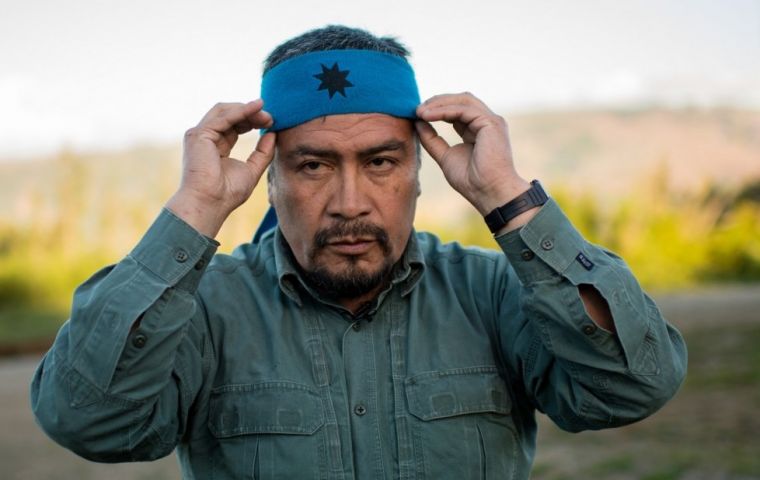MercoPress. South Atlantic News Agency
Llaitul goes on hunger strike to demand a prompt Chilean Supreme Court review of his case
 Llaitul, 56, is one of the founders of the CAM, the oldest radical group in southern Chile claiming to defend ancestral land rights
Llaitul, 56, is one of the founders of the CAM, the oldest radical group in southern Chile claiming to defend ancestral land rights Convicted Mapuche leader Héctor Llaitul Monday went on a hunger strike from his Chilean prison to protest against his 23-year jail sentence for timber theft, usurpation of land, and assault on authorities since the 1990s.
The Arauco Malleco Coordinating Committee (CAM) rebel issued a statement from the Concepción penitentiary demanding his trial and subsequent sentencing on May 7 this year be declared null and that the appeals he filed a few weeks ago be reviewed by the Supreme Court.
The CAM is an indigenous, autonomist, anti-colonial, anti-capitalist, and revolutionary organization allegedly fighting for the native people's right to what they call their ancestral lands now held b y multinational timber companies.
“To the communities in resistance and to the public opinion in general, we communicate that, today, Monday, June 03, the werken of the CAM, Hector Llaitul Carrillanca has decided to start a hunger strike,” read a declaration from the native group.
A “werkén” or “werke” (from the Mapudungun werken, “messenger”), also spelled “huerquén” or “huerque,” is one of the traditional authorities of the Mapuche people, who fulfills the functions of world advisor or “lonco” and is usually the spokesperson for his community.
Llaitul also demanded “dignified prison conditions and respect for the human rights of Mapuche political prisoners,” in addition to “freedom” for his two sons Ernesto and Pelentario Llaitul, both in preventive detention.
The Chilean regions of La Araucanía and Biobío have witnessed an ongoing conflict involving native peoples, the Chilean State, and large landowners and forestry companies.
Llaitul, 56, is one of the founders of the CAM, a group that openly resorted to violence in its revindication claims, usually staging arson attacks on property and agriculture machinery in southern Chile. He was convicted earlier this year by the Oral Criminal Court of Temuco, some 640 kilometers south of Santiago in the Araucanía region. In handing down Llauitul's sentence, the court took into account the State's Internal Security Act invoked by the prosecution, which entails harsher penalties.
The leader and founder of CAM was arrested by two detectives of the Investigative Police in August 2022 in Cañete, in the Biobío region, when he entered a local restaurant for lunch. The CAM staged its first attack on Dec. 1, 1997, when three lorries were set on fire in Lumaco, in La Araucanía, marking the beginning of violence in Chile's Southern Macro-zone. To this day there are at least six other radical groups in the area burning property and seizing land citing ancestral rights.
Llaitul was sentenced to 15 years as the perpetrator of the consummated and reiterated crime against public order, five years as the perpetrator of the consummated crime of theft of timber from forestry companies, and another three years as the perpetrator of the consummated crime of attacking a person of authority.




Top Comments
Disclaimer & comment rulesCommenting for this story is now closed.
If you have a Facebook account, become a fan and comment on our Facebook Page!